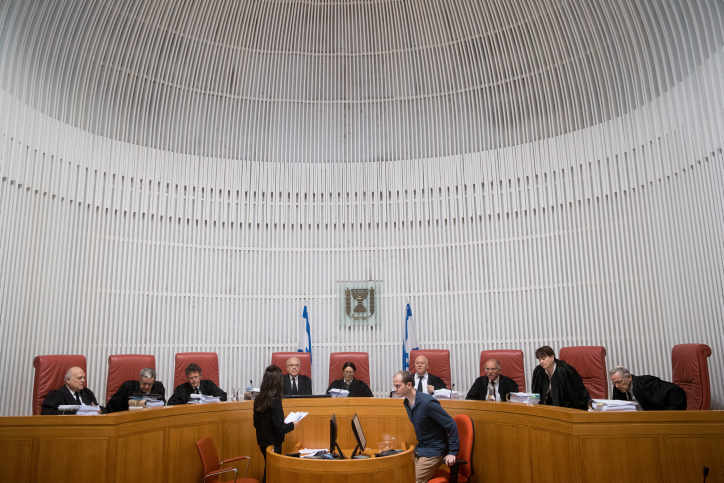The far right wants to defang Israel’s highest court to fulfill its annexationist dreams. Netanyahu wants to overpower it to ensure he remains on the throne. For Palestinians, annexation has long been a fact on the ground.
By Meron Rapoport

The attacks on Israel’s High Court by the right would not have gained traction without Prime Minister Netanyahu’s personal support. These include an attempt to pass a bill that would not only allow the Knesset to re-legislate laws struck down by the judiciary, but also prevent the High Court from intervening in administrative decisions by the government, the ministers, and the Knesset. Netanyahu is hoping to prevent judicial review over any number of laws that would seek to shield him from prosecution over the various corruption scandals in which he is embroiled.
The right speaks openly about the need to broadly “govern,” as well as the need to dismantle the “dictatorship of the High Court” in order to “give power back to the people.” But nowhere is this so-called “governance” more relevant than the area over which Israel has been trying to hide its rule for 52 years: the occupied territories.
The great paradox
Two of the laws Netanyahu singled out as reasons for passing a “court override bill” are directly related to the occupied territories: a bill calling for the death penalty for convicted Palestinian killers of Israeli civilians and soldiers, and another bill that would allow Israel to deport the families of those Palestinians. It is clear why Bezalel Smotrich of the United Right party made the override bill a central condition of the current coalition negotiations with the prime minister. The Regularization Law, which retroactively legalizes West Bank outposts deemed illegal by Israeli law and will likely be struck down by the High Court, is a prime example of the kind of laws Smotrich wants to enshrine without the threat of judicial oversight.
Israeli human rights organization Yesh Din has recorded a few dozen “annexation laws” that are already on the docket for the upcoming Knesset, some of which legislate the annexation parts or the entirety of the West Bank, legalize the theft of Palestinian land, or simply blur the Green Line. The moment the threat of the High Court’s oversight disappears, the sky is the limit for Smotrich and the rest of the Israeli far right.
Nearly every single article in Smotrich’s so-called “Decisive Plan” — which includes annexing the West Bank without granting Palestinians equal civil rights, while incentivizing them to leave the country — would be struck down by the High Court. From his point of view, the override bill becomes a necessity without which the settler right sees no point in joining the government.

Herein lies the great paradox. The Israeli right needs the override bill in order to entrench annexation and blur the Green Line, and it wants to do so in order to break the status quo — to defeat the Palestinians once and for all. Interestingly, until now, Netanyahu has preferred to support the status quo and prevent annexation, and had previously opposed the override bill. Now, because of his need for immunity, he has changed positions. This is what binds Netanyahu to someone like Smotrich.
Annexation is a fact on the ground
Palestinians aren’t afraid of these annexation policies, particularly because annexation has already been happening. The settlements in Area C bifurcate the West Bank, and the High Court, which was supposed to protect the Palestinians as an occupied people according to international law, never did its job. Thus, annexation isn’t widely viewed as a threat. In the worst case, the Palestinians’ situation in the West Bank will remain as it is: residents of the territory living alongside growing settlements. In the best case scenario, it will bolster the PLO’s case against Israel and grant a few hundred thousand Palestinians citizenship.
But it goes even further: annexation may bring Palestinians closer to a single state between the river and the sea, which has always remained a dream for many of them. In other words, the annexation sword being dangled in front of the Palestinians is seen by many of them as double-edged, and will eventually undo the “Jewish state.”

Still, the override bill and immunity for Netanyahu are viewed as an attack on democracy inside Israel. Aside from the usual suspects among civil society organizations — women and LGBTQ groups, civil rights organizations, Palestinian NGOs, and more — who view this as a direct attack, we are now witnessing an awakening by segments of the Israeli elite, which have been cautious about speaking out against Netanyahu.
Dozens of Israeli attorneys, including leading, non-leftist candidates vying to head the Israel Bar Association, organized a conference in which they warned that “the rule of law is on the precipice,” threatening to shut down the legal system. One-hundred and thirty law lecturers from across the country signed a petition according to which the government’s attempts to defang the judiciary will cause “irreparable damage to democracy.”
On Thursday, Israeli business newspaper Calcalist published that a group of 100 entrepreneurs, most of them from the tech sector, signed a similar petition. Benny Gantz’s Blue and White party, which did its best not to step on anyone’s toes during the election cycle, is now threatening to “set fire to the country” in order to save democracy.
It is easy to become cynical in the face of these calls to “save Israeli democracy” — a democracy that hardly exists in the first place when it comes to Palestinians. Neither does Israeli democracy do much to protect human rights groups, which have come under constant attack in the past years. It is hard to question the sense of urgency that prevails among parts of the Israeli elite, and its importance should not be underestimated.
The elite is energized by the combination of two moves: immunity for Netanyahu, and a bolder override bill. Both are viewed as a violation of the rules of the game, and a concentration of power in the hands of politicians — especially one politician. The elite doesn’t like this kind of situation. It prefers certainty, provided by a strong judicial system. It is much harder to trust politicians, especially the kind that rule today.
That is how an attempt to defeat the Palestinians, or at the very least threaten them, comes to be seen by many in the Israeli elite as a threat to the democratic game. It is still too early to know what the result will be. Will the right-wing coalition be forced to forgo part of its revolution? Will the elite go to war against the government?
Either way, Netanyahu’s government has created a much bigger opposition than what it was previously used to: not only Palestinians in the occupied territories or inside Israel, not only the Jewish radical left, but also large segments of the elite. In the current darkness, this is, at the very least, a small ray of light.
This article was first published in Hebrew on Local Call. Read it here.
